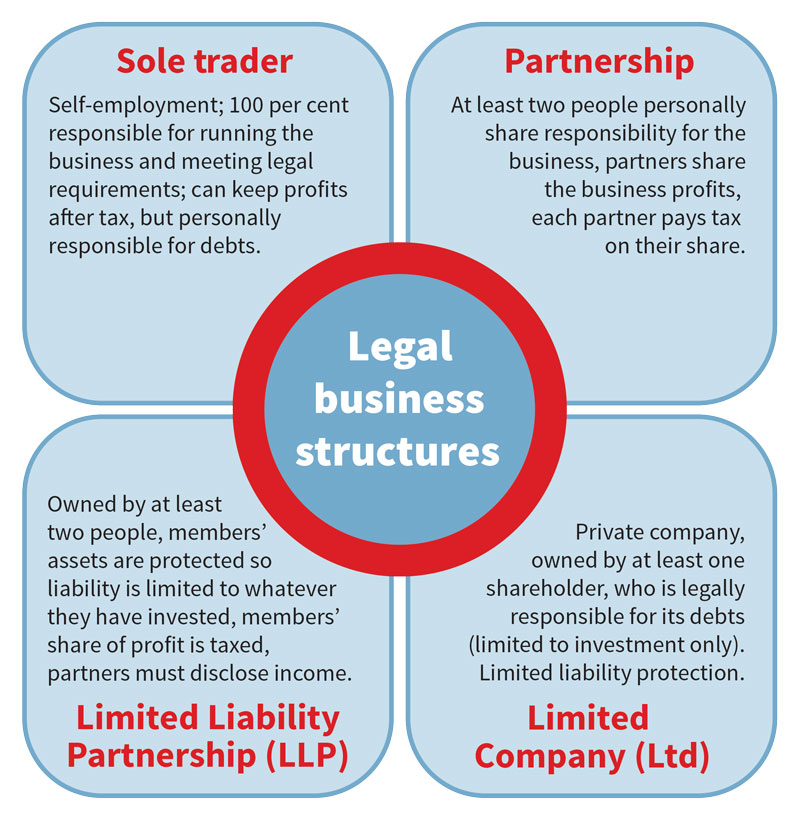The first thing to decide when going it alone is which form of business vehicle to use – sole trader, partnership or limited company.
Sole trader (self-employment) is the simplest. You work on your own account, either under your own name or a different trading name, and are entitled to all profits, but are personally liable for all debts. Formation costs nothing and financial accounts do not have to be audited or filed at Companies House. You draw money from the business as required and pay tax on the profit.
A partnership consists of two or more people (or entities) carrying on business together. You are each dealt with separately for most tax purposes, but are all jointly and severally liable for partnership debts. You might choose a partnership for the same reason as being a sole trader, except that you want a more formal structure conferred via a written partnership deed. Partnerships can also have limited liability for debts.
Limited companies are commonly chosen because registration makes them a separate legal person; the liability of shareholders is normally limited to the number of shares that they have bought. But limited companies carry cost – accounts, registration and so on. Also, companies are taxed on their profits, and their members – you – and employees are taxed separately on remuneration and dividends received from the company.
It should be pointed out that rules exist on what a business can call itself. Specifically, “royal” and “British” are protected terms while “limited” or “Ltd” can only be used by incorporated businesses. Note that if “vet” or “veterinary”, or similar, is used in a company name, permission from the RCVS will be needed – email info@rcvs.org.uk
And on the topic of the RCVS, practices will need to follow the rules and standards set down by the body.
Tax
You may have chosen the “entity” for the business, but you need to have in mind the legal and regulatory elements of business. You must tell HM Revenue and Customs that you are trading. You may also need to register for VAT. Registration is voluntary if turnover is under the VAT threshold of £85,000 (unlikely for a practice, though). But remember this is a rolling 12-month threshold. If at any point it is possible that turnover for the next 12 months could exceed the threshold, you must register.
HMRC offers several VAT schemes to make life easier. These include a flat rate scheme where you’d only pay VAT on a flat percentage of turnover (but you can’t reclaim VAT on your purchases) – the scheme minimises administration, annual accounts where quarterly returns are dropped for one annual return, and cash accounting, which means you’d only pay (or reclaim) VAT on monies actually received rather than invoiced – great for cash flow and instant relief on VAT in case of a bad debt.
Advice
Accountants
A good qualified accountant is necessary; anyone can call themselves an accountant, so it’s important to find someone who is a member of a professional body. Several organisations (details listed at the end) exist to help and protect the public, as well as regulate the profession. The main two are the Institute of Chartered Accountants in England and Wales, and the Association of Chartered Certified Accountants – Scottish and Irish equivalents exist.
The members of all of these organisations have undergone training and examinations to join. They are professionally qualified, and each organisation has its own method of supervising members and complaints handling should you ever have a problem.
As to who to choose, look for a firm that specialises in veterinary medicine or, alternatively, ask friends – even rivals – for personal recommendations.
Lawyers
The process for choosing a lawyer is similar to that for an accountant. Apart from personal recommendations, your best bet to find a good lawyer is to consult one of the two “professional bibles” – The Legal 500, and Chambers and Partners Directory. Both are useful as they are a review of lawyers for clients.
Both list firms by region and their specialities, together with firms’ own editorial about themselves. Also listed is experience, fees, as well as partners’ names and firms’ addresses.
But if you prefer, you could try contacting The Law Society for names of firms with known expertise in given areas.
Premises
Practice premises are a key consideration and it shouldn’t be forgotten that landlords skew contracts in their favour. Good surveyors are a must; they will look for the booby traps such as dilapidations, insurance and common usage charges, break clauses and upwards-only rent reviews.
Would-be practice owners also need to note that to store and supply veterinary medicines, premises must be on the Register of Veterinary Practice Premises. This allows the VMD to account for medicines held. To add premises to the register, the RCVS registration department should be contacted via rvpp@rcvs.org.uk
Other considerations in relation to premises include choosing the best utilities deal – comparison sites (search online for “compare business utilities”) can help with double digit savings over standard tariffs, and also checking that the business rates have been set correctly.
Again, a surveyor can help with this, too.

Finance your future
To open a business bank account, you will need various forms of documentation including several forms of identity (for you) and for the business. Despite what you may have heard, you don’t have to pay (high or any) bank charges. Most will gravitate to the high street, but it’s also worth looking at challenger banks such as Monzo and Starling.
They tend to be online and app only – no paying in books or cheque books – but they are low cost, efficient, and still permit the depositing of cash and cheques.
If a main high street bank is the preferred option, look for those that offer free banking periods, “free” add-ons and services, and also check for accounts package integration.
On the subject of finance, a web search for “finance for veterinary practice” will return a number of options of firms that cater specifically for practices.
Whether it’s for a loan or asset-based finance, plenty of options exist. Seek enough funding so that you don’t overtrade (run out of cash to cope with rising levels of business).
Finally, a benefit exists of being in business – employees have tax and National Insurance taken from their pay automatically at source. Not so for the self-employed and business owners. Taxes, National Insurance and VAT are paid in arrears.
So, remember to automatically move all VAT received and a fixed proportion of the net revenue into higher rate interest savings accounts so money can work for you. It also means you’ll have on one side all of the money you need to pay your taxes to HMRC as they fall due.
Seek financial advice
Finally, being employed brings plenty of benefits, including a company pension, health care and death in service benefit. But now that you are on your own, you’ll have to fend for yourself.
At the minimum you need critical illness cover (pays out a lump sum on any one of a set of illnesses or diseases), income protection insurance (pays a monthly allowance based on your income where you cannot work because of illness or disablement), life insurance (pays your estate if you die) and, if in business with someone else, keyman insurance (pays a sum sufficient to allow you to buy out your partner’s share of the business should he or she die).
You can find an independent financial advisor at www.unbiased.co.uk/find-an-ifa
Professional perspective: HR4VETS
Four essential legal considerations exist when setting up your own practice:
Regulatory
The RCVS Practice Standards Scheme is voluntary, but it is a requirement of the RCVS Code of Professional Conduct for Veterinary Surgeons that practices must at least meet its core standards of compliance with legal, and health and safety, requirements.
To meet the core standards we advise those setting up a new practice to consult the RCVS Practice Standards Scheme.
Employment
Early considerations of resource requirement and following rigorous recruitment practices are essential steps to ensure staff are well-fed, well-managed and not overstretched.
Remembering to document recruitment processes avoids future issues: putting signed employment contracts in place, requesting references and checking Right to Work documents are fundamental considerations.
Likewise, future planning HR needs by producing a handbook, disciplinary and grievance procedures is time well-invested.
Corporate
Are you going to operate your business as a sole trader, partnership or a limited company? Tax and accountancy advice is crucial when making a decision; however, often veterinary practices are established as limited companies.
Limited companies are advantageous from a legal perspective as they are established as separate legal entities; limiting personal exposure to liability. If more than one shareholder (owner) of the new business is going to exist, it is crucial you consider entering into a shareholders agreement to govern the relationship between the shareholders.
Property
If the start-up has a healthy cash pot, it is worth investing in a freehold property owned by individuals and leased back to the company. The landlord and the tenant will be related parties, retaining control of important items: rent, rent reviews and dilapidations.
If purchase is not viable, opt to enter into a lease with a third-party landlord. Remember – when negotiating the terms of occupation – break clauses (allowing the break of the lease at certain times), repair clause (qualified by a photographic schedule of condition), rent review based on the open market, and a lease within the Landlord and Tenant Act 1954 for security of tenure (to renew on the same terms).

Leave a Reply